
The Music of Puerto Rico has evolved as a heterogeneous and dynamic product of diverse cultural resources. The most conspicuous musical sources of Puerto Rico have primarily included European, Indigenous, and African influences, although many aspects of Puerto Rican music reflect origins elsewhere in the Caribbean. Puerto Rican music culture today comprises a wide and rich variety of genres, ranging from essentially native genres such as bomba, danza, and plena to more recent hybrid genres such as salsa, Latin trap and reggaeton. Broadly conceived, the realm of "Puerto Rican music" should naturally comprise the music culture of the millions of people of Puerto Rican descent who have lived in the United States, especially in New York City. Their music, from salsa to the boleros of Rafael Hernández, cannot be separated from the music culture of Puerto Rico itself.
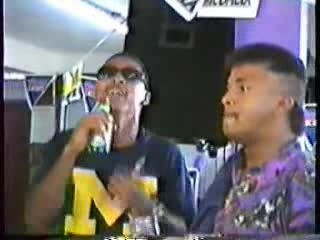
Reggaeton, also known as reggaetón and reguetón, is a style of popular and electronic music that originated in Panama during the late 1980s. It was later popularized in Puerto Rico.

Tegui Calderón Rosario is a Puerto Rican rapper, singer and actor. He began his musical career in 1996 and was supported by the famous Puerto Rican rapper Eddie Dee, who invited him on his second studio album, El Terrorista de la Lírica, released in 2000. Calderón reached international success in 2003 with his first album, El Abayarde, which sold 300,000 copies worldwide and was nominated for a Latin Grammy Award. His importance in reggaeton music led him to participate in Eddie Dee's 12 Discípulos album in 2004. He released three more studio albums between 2006 and 2015, varying in styles, focusing more in hip hop and African music rather than reggaeton in The Underdog/El Subestimado (2006) and El Abayarde Contraataca (2007). His fourth studio album, El Que Sabe, Sabe, released in 2015, won a Latin Grammy Award for Best Urban Music Album. In the same year, he announced that he is planning a studio album alongside the Puerto Rican singer Yandel titled El Blanco y el Negro.

Martha Ivelisse Pesante Rodríguez, known professionally as Ivy Queen, is a Puerto Rican singer, rapper, songwriter, and actress. She is considered one of the pioneers of the reggaeton genre, commonly referred to as the Queen of Reggaeton.

Calle 13 is a Puerto Rican alternative hip-hop band formed by stepbrothers Residente and Visitante, along with their half-sister iLe, also known as PG-13.
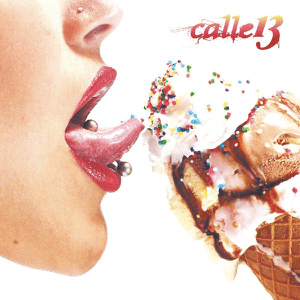
Calle 13 is the debut studio album by Puerto Rican urban/hip hop band Calle 13, released on November 29, 2005 by White Lion Records. The album was recorded in the wake of the group's online success with the song "Querido FBI". The album received positive reviews, with critics praising Residente's lyrical style and the musical diversity displayed on the record.
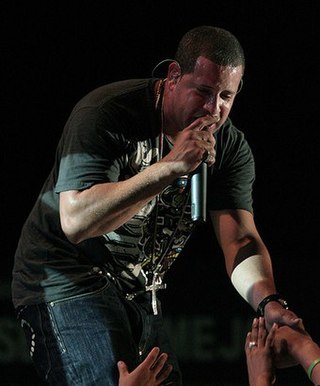
Julio Voltio is a Puerto Rican former reggaeton artist. A pioneer of the reggaeton genre, Voltio retired from music in 2014 and dedicated himself to preaching Christianity.
Bachatón is a fusion genre of reggaeton from Puerto Rico as well as bachata from the Dominican Republic. Bachaton combines bachata melodies and reggaeton style beats, lyrics, rapping, and disc jockeying. As it is implied by the genre name, the word "bachatón" is a combination of "bachata" and "reggaeton". "Bachatón" was coined and widely accepted in 2005. It is a subgenre of reggaeton and bachata.
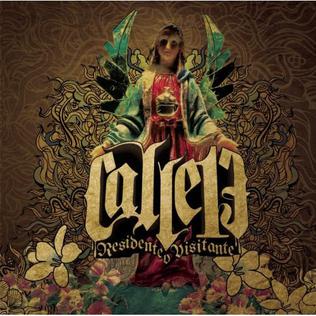
Residente o Visitante is the second studio album by Puerto Rican urban/hip hop band Calle 13, released on April 24, 2007, by Sony BMG. Recorded in various countries while on tour in promotion of the duo's debut album Calle 13, Residente o Visitante marked an evolution in the band's musical and lyrical style. While writing the album, the duo took a trip to South America to explore areas populated by Latin America's indigenous and African-descended minorities, a journey that greatly influenced the music on Residente o Visitante. The album features six guest artists and delves into genres such as tango, bossa nova, cumbia, and electronica.
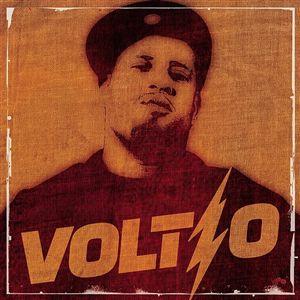
Voltage DC is the eponymous second studio album by Puerto Rican reggaeton performer Voltio, released on December 27, 2005, by Sony BMG and White Lion.
White Lion Records is a reggaeton, Latin Music, Latín reggae and urbano record label established by Elías de León with the release of the album No Mercy by Daddy Yankee in 1995. The label would temporarily change its name to 'Boricua Guerrero' from 1996-2001 until reestablishing as White Lion Records with the releases of Maicol y Manuel's "Como En Los Tiempos De Antes" and the compilation "Planet Reggae" in 2002. As an independent label in 2003, it was selling over 100,000 copies of Tego Calderon's most recent album at the time; it soon after signed a distribution deal with Sony BMG.
Latin alternative, or "alterlatino", is a brand of Latin rock music produced by combining genres like alternative rock, lofi, chillout, metal, electronica, hip hop, new wave, pop rock, punk rock, reggae, and ska with traditional Ibero-American sounds, in Latin Europeans and Latin Americans countries.
Lito & Polaco were a Puerto Rican hip hop duo from Carolina, Puerto Rico.
Paul Frederick Irizarry Suau,, known professionally as Echo, is a Puerto Rican record producer and songwriter.
José Fernando Cosculluela Suárez, known professionally as Cosculluela, is a Puerto Rican rapper, singer and songwriter. In 2018, he was caught up in a controversy after fellow Puerto Rican rapper Anuel AA released a diss track.
"Bandoleros" is a song by Puerto Rican reggaeton artist Don Omar featuring Puerto Rican artist Tego Calderón. Released in 2005 as the lead single from his compilation album Los Bandoleros, it was also featured in the 2006 film The Fast and the Furious: Tokyo Drift. It has been referred to as one of the breakthrough songs that brought latin hip hop airplay to the United States.
Eddie Alexander Ávila Ortiz, originally known by his stage name Eddie Dee, is a Puerto Rican hip hop recording artist, lyricist and dancer. He began his career in 1990 and launched his debut studio album three years later. He became one of the more popular Urban artists from Puerto Rico after appearing on DJ Adam's Mad Jam vol. 2 in 1997. It featured the hit single "Señor Official". His following releases El Terrorista de la Lírica (2000) and Biografía (2001), too enjoyed underground success. The 2004 album 12 Discípulos is regarded as "the greatest reggaetón various artist album of all time". The album features songs by some of the most successful reggaetón artist, including the intro of the album, where they all come together as one to show that "unity is needed for the genre reggaetón to survive and evolve". It was a collaboration between eleven other artist including Daddy Yankee, Tego Calderón, Ivy Queen, and Vico C among others, who were among the most requested at the time. The track, known as "Los 12 Discípulos" or "Quítate Tu Pa' Ponerme Yo" reached number eight on the Billboard Tropical Songs chart, and was nominated for a 2005 Billboard Latin Music Award for "Tropical Airplay Track of the Year, New Artist". The album itself reached number one on the Billboard Tropical Albums chart for three nonconsecutive weeks. Though retired since 2015, Eddie Dee is generally regarded within the worldwide Reggaeton and Spanish Hip Hop Communities as one of its most important and influential figures alongside the likes of Daddy Yankee, Vico C, Tego Calderón and Ivy Queen. Tagwut is actually an album by DJ Black, not Eddie Dee but he appears in it performing one of his hits 'Directamente Del Ghetto'.

Cosa Nostra: Hip Hop is the second compilation album by Puerto Rican recording artist Ivy Queen, and the first by Puerto Rican-American recording artist Gran Omar. It was released on 15 November 2005. The album features songs performed in the genre of hip hop by Ivy Queen, Gran Omar, Arcangel, De La Ghetto, Terror Squad's Tony Sunshine, Rey Severo, Haze and Moreno.
Urbano music or Latin urban is a transnational umbrella category including many different genres and styles. As an umbrella term it includes reggaeton, dancehall, dembow, urban champeta, funk carioca and Latin hip hop. The commercial breakthrough of this music took place in 2017. Artists in the style collaborate transnationally, and may originate from the United States, Colombia, Cuba, the Dominican Republic, Panama, Venezuela or other Spanish-speaking nations, as well as Portuguese-speaking Brazil.








